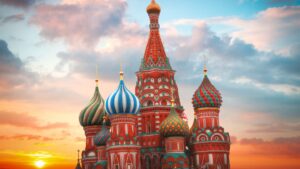The FIFA World Cup in Russia was a huge success on the field, but will Russia see the long-term benefits?
Many are commenting that the 2018 FIFA World Cup is having an extremely positive net benefit for host nation Russia and President Vladimir Putin in PR terms.


The tournament was a thrill-a-minute on the field and soccer fans from across the world have been made to feel welcome with few, if any, media reports of racism, hooliganism, or crime. With the country having reportedly spent over $14 billion on hosting the tournament, this World Cup is the most expensive in its history. Yet experts are generally downbeat about any long-term economic benefit for Russia. Why?
Countries hosting major international sporting events such as the Olympics and the World Cup frequently see economic benefits in the shape of additional public spending, job creation, tourism, and a less tangible boost in their public image, which can even affect areas of economic activity such as trade.
Yet reports published in the build-up to the tournament paint a different view.
The Wold Cup limits
“Russia will only experience a short-lived economic benefit from hosting the 2018 FIFA World Cup tournament,” Moody’s Investor Service said in a report published in May that analyzed spending and projected gains from the tournament.
“Much of the economic impact has already been felt through infrastructure spending, and even there the impact has been limited. World Cup-related investments in 2013-17 accounted for only 1 percent of total investments,” the report added.
The report concluded that the eleven Russian cities that are hosting matches have seen an improvement in transport and utility infrastructure but that has come at a cost.


“For the Russian regions, new infrastructure will generate additional tax revenue and decrease future capital spending,” Moody’s said, but World Cup spending had negatively impacted government finances in other regions, such as the city of St. Petersburg and the region of Samara Oblast.
Another potential area for an economic boost for Russia is tourism. Its best-known cities, Moscow and St. Petersburg, are the main fan hubs and the latter is expected to host 400,000 visitors during the World Cup. These cities are also the main hubs for tourists in general.
From Russia with love
Market research company Euromonitor believes the World Cup could put Russia on the map for more tourists after the tournament ends. The firm forecast a 1.4 percent increase in the number of total arrivals to Russia in 2018, as a direct result of hosting the major sporting event.
“However, negative factors, such as lack of mid-tier accommodation facilities, safety concerns, relatively high visiting costs and burdensome visa regulations for non-ticket holders will have an impact on the incoming tourist flows,” they added.
With Russia still currently under US sanctions and relations with other western powers, notably the UK, at a recent all-time low, it remains to be seen if Russia can use the World Cup as a springboard to repair its international reputation and build a name as a safe and welcoming tourist destination once the tournament ends. Meanwhile, the Russian government will hope that the “white elephant” effect of public infrastructure spending that haunted previous hosts, Brazil and South Africa, does not repeat itself.













